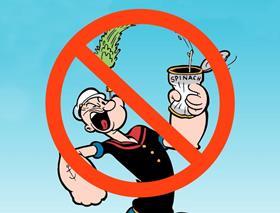
Consumers across Europe may have been told for decades that an apple a day keeps the doctor away, that carrots will help them see in the dark, that spinach will give them muscles of Popeye proportions and that a diet rich in fruit and vegetables will make them live longer, but from mid-December companies selling fruit and vegetables in the European Union will no longer be allowed to claim that a Mediterranean diet improves consumer health, for example by boosting heart activity.
With new laws banning scientifically unsubstantiated and unproven health claims on food products sold in the EU set to be introduced on 14 December following a period of transition, marketing messages used to promote several fresh produce lines are likely to be affected and will have to be removed so the products do not incur fines.
Eurofruit understands several other claims will be banned, including: that cranberries, cranberry juice and other related products can help prevent urinary tract infection; that persimmons contribute to the maintenance of normal vision; and that olives, olive oil and other processed olive products can help maintain normal blood pressure and reduce inflammation.
The Nutrition and Health Claims Regulation (NHCR), which is due to be enforced by the European Food Safety Authority (EFSA) and associated agencies in each EU member country, is expected to affect food ingredients suppliers most.
Article 13.1 of the regulation currently includes a list of just 222 approved health claims, meaning certain messages, for example that calcium is required for the maintenance of healthy bones, or that Vitamin C contributes to the normal functioning of the immune system, will continue to be allowed.
Other claims that are as yet unproven – for example, that iron contained in food products can help reduce excessive hair loss – will be banned.
Another high-profile casualty of the crackdown is expected to be the word probiotic, a commonly used recent neologism found on a range of yoghurts and drinks.
Since the World Health Organization's definition of the word describes micro-organisms conferring a health benefit, the term is classified as containing an inherent, and thus far unproven, claim.
Backlog of claims
The European Commission is currently investigating the impact of NHCR on obesity rates in the EU, the findings of which are due to be published in 2013.
Speaking in Berlin this week, Germany's Consumer Protection Minister Ilse Aigner welcomed the rules' official introduction, describing it as an important step towards greater transparency in food.
"Consumers must be able to rely on health claims. What's on the packaging must also be correct," she said. "People in Europe will now be much better protected from misleading advertising of health claims."
Following an invitation to submit health claims for scientific assessment in 2008, member states received around 44,000 applications, of which 4,600 were forwarded to EFSA. Only 222 have so far been approved.
According to EFSA, around 2,000 applications relating to botanicals and their potential health-enhancing properties still need to be processed, with the assessment of an additional 200-300 items – including micro-organisms – also pending.



